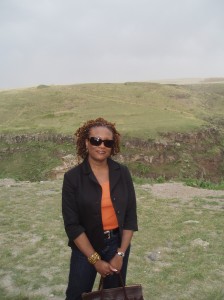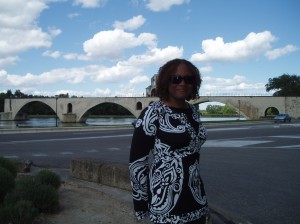

Late last month, I wrote about the “hair issues” we black women often face when traveling abroad—and promised to offer some tips about handling these when you’re overseas.
When I first traveled to Europe in the late 1990s, visiting a friend who worked on a U.S. Army base in Germany, I was doing the relaxed hair thing, toting multiple curling irons and assorted lotions and potions in my always-overstuffed suitcase. But once I started hitting the road with friends, all those curling irons became a royal pain. What a hassle to constantly be plugging in, moving irons from one room to the other, waiting for them to cool down before you could pack them, etc. And then there was always the issue of “what if it rains?”
Now that I’ve been wearing two-strand twist extensions for most of the past five years, that’s no longer a concern. BUT, I have gotten overseas and much to my dismay, realized that I forgot to pack my favorite olive oil sheen or softening lotion. This, my friends, can be a challenge—especially since overseas trips tend to last for more than just a weekend.
But if you find yourself in a city—especially in Europe—and have arrived sans products, I’ve discovered that black folks and Arabs (who frequently have similar hair textures as ours) often live near the city’s main train station. Perhaps it’s the “immigrant effect,” the fact that newer arrivals to a place often live close to the vehicles that bring them. So if these folks first arrive via train, inexpensive housing in the surrounding area might be their first stop.
When I lived in Florence, Italy, between 2004 and 2005, I (mercifully) found the Nigerian-owned barber shop/salon where I got my twist touch-ups done a couple streets away from the city’s Santa Maria Novella train station. (My young stylist Nina would hook up my twists, while her barber shop-owning brother took care of the African and Arab bros in the adjoining room.) I know that Africans live near Rome’s massive Termini station, as I once found myself strolling through the ‘hood in search of an Ethiopian eatery.
And when visiting the south of France last spring, I didn’t pack my Organic Root Stimulator olive oil sheen spray (as usual, my bag was too full and something had to give). But I figured that once I got to the more cosmopolitan town of Nice, surely I’d use my limited French to find some black folks and some hair spray. So after leaving the city’s main train station, I walked half a block to an Internet café with an Arab guy at the counter. Grateful he spoke some English, I asked, “Where can I find a salon for people with hair like this?” as I gently fingered my twists. OF COURSE, there was one right around the block—and hanging out nearby on street corners were African and Arab men, just as brothers often do here in the States. It was like I’d never left the South Side of Chicago.
Not only did I find a salon owned by a kind African woman, but she directed me down the block to a black hair-care supply store where I found EVERYTHING I needed, and then some. I’ve made a mental note of the salon’s and store’s street so next time I’m in the south of France and need a hook-up, I am SO there.
Which leads to my next point: do some research BEFORE you leave home. You aren’t planning to find yourself in a massive rainstorm on your next trip, but what if it happens and you aren’t adept at wielding a flat iron and fixing your OWN ‘do? Might be wise to have the name and phone number of a salon in the place you’re going. Think of it like stashing just-in-case antibiotics or a first-aid kit. If you’re headed to Central Europe, EbonyPrague.com can take care of your hair. If you’re going to the UK (thankfully, with black folks galore), check out ItzCaribbean.com for a host of hair salons throughout the metro London area. And if you’re traveling elsewhere in the world, BlackGirlTravel.com, where founder Fleacé Weaver creates and leads customized tours for groups of African-American women to countries around the world, you’ll find salon listings from Amsterdam to Hong Kong to Dubai. Talk about hooking a sista up!
And just as our moms always told us to use a clean bathroom whenever we found one (since the next ones might be few and far-between), if you’re strolling down some foreign street and see a either a black/ethnic hair salon or barber shop, drop in and ask for a business card. You may not be planning to get your “hair did” in Madrid, but if your curling iron suddenly blows out or a downpour trashes your bob, you’ll be glad you know where to get your ‘do back on again. Think of it as “hair insurance.”
I’d love to hear YOUR tips—as well as about your overseas hair experiences and how you handle your tresses on the road. Feel free to share!


